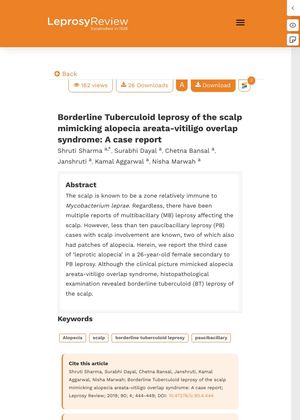Borderline Tuberculoid Leprosy of the Scalp Mimicking Alopecia Areata-Vitiligo Overlap Syndrome: A Case Report
December 2019
in “
Leprosy Review
”

TLDR A woman's hair loss and skin discoloration were found to be caused by a rare case of leprosy on the scalp, not alopecia-vitiligo overlap.
In 2019, a case study reported the third known instance of 'leprotic alopecia', a condition where hair loss is caused by paucibacillary leprosy (PB), a less severe form of leprosy. The case involved a 26-year-old female who initially appeared to have alopecia areata-vitiligo overlap syndrome, a condition characterized by hair loss and skin discoloration. However, a histopathological examination revealed that she actually had borderline tuberculoid (BT) leprosy of the scalp. This was a rare occurrence, as the scalp is generally considered relatively immune to Mycobacterium leprae, the bacterium that causes leprosy. Prior to this case, less than ten instances of scalp involvement in PB leprosy had been reported, with only two of those also presenting with alopecia.


